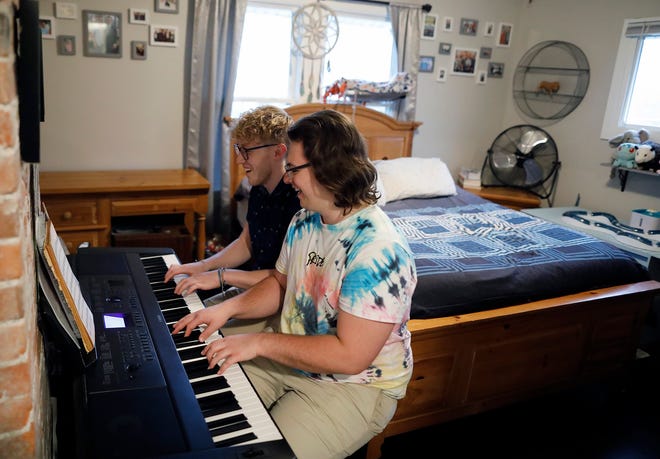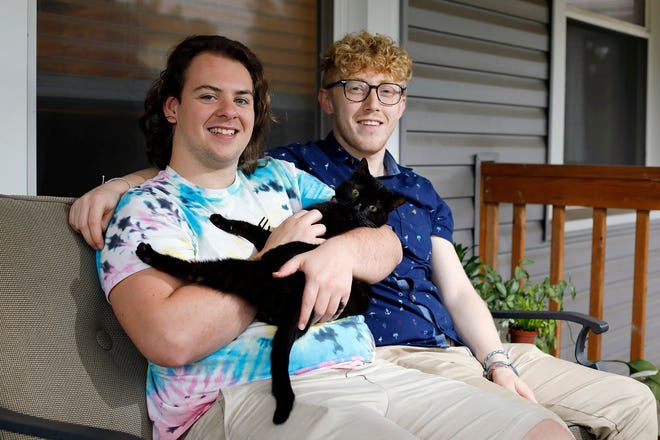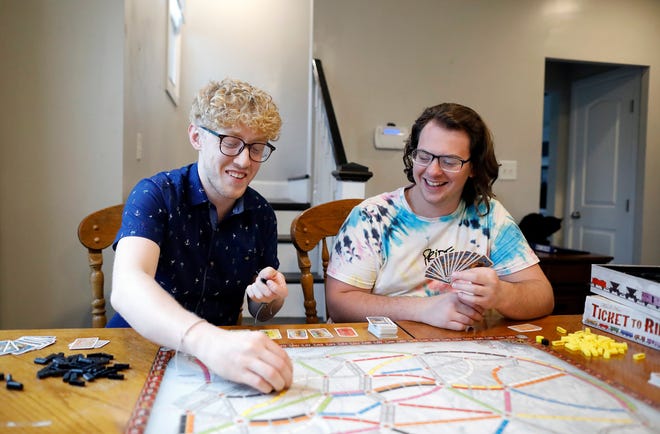
There was a time in his life when Philip Baltzer thought that if he prayed, read the Bible and didn’t think about being attracted to men, he could shed his identity.
But not long after going through what he described as damaging, painful “therapy” with a local Baptist pastor, Baltzer realized he couldn’t change who he was.
Now, he doesn’t want to.
Baltzer, 24, said he discovered after watching the Netflix documentary “Pray Away,” released in August, that he had been through a form of conversion therapy at the age of 19.
‘Jesus is all things’:LGBTQ Christians share how they reconcile faith, identity during Stonewall Columbus panel
Conversion therapy is any practice aimed at changing an individual’s sexual orientation or gender identity, including trying “to reduce or eliminate sexual or romantic attraction or feelings toward a person of the same gender,” according to the Trevor Project, a suicide prevention and crisis intervention organization for young LGBTQ people.
The practice also can double the risk of suicide for LGBTQ youth, according to the project.
Baltzer said a trusted pastor for whom he admitted his same-sex attraction “counseled” him on how to get rid of those thoughts. The pastor also reassured Baltzer, he said, that being gay was no worse than adultery, lying or stealing — they were all just sins.
700,000 people have gone through conversion therapy
Baltzer, who identifies as queer and pansexual, remembers watching the statistics on the screen before the credits of “Pray Away” rolled: “Approximately 700,000 people have gone through a form of conversion therapy in the U.S. alone.”
He said he realized while watching the documentary that he’d been through months of conversion therapy himself. The movie focuses on former leaders of the movement who are now out and denounce the practice.

He also realized there were probably others like him who felt that their real selves were intrinsically wrong and broken.
“You’re not broken,” he said. “You don’t need to fix that part of yourself because there’s nothing really to fix. That’s just part of who you are. Once you can get past that part … it’s a lot easier to focus on the rest of your life and focus on your happiness.”
Advocating for change
Despite being widely discredited as unethical and ineffective, conversion therapy is still happening across the country, said Sam Brinton, vice president of advocacy and government affairs at the Trevor Project, who uses they/them pronouns.
It’s why there’s legislation in 20 states to stop it, they said. Some states have issued executive orders, regulations or toppled funding to organizations that do the therapy.
Lawmakers, LGBTQ rights activists and mental health professionals in Ohio have been trying to ban conversion therapy for minors since at least 2015, said Danielle Smith, executive director of the National Association of Social Workers’ Ohio chapter.
Like many other cities, Columbus banned the practice in 2017. Several professional associations such at the American Medical Association and the American Psychological Association also have condemned conversion therapy.
Reconciling congregations:Facing Methodist split, young people say they’re committed to LGBT acceptance
Ohio Senate Bill 50, which would ban conversion therapy for minors by licensed practitioners, was introduced in February and is still in committee. This is at least the fourth time the bill has been introduced since 2015, Smith said, but advocates remain hopeful.
She said one way advocates have gotten around lawmakers is by working with licensing boards to issue guidance saying conversion therapy is harmful and prohibited.
Still, none of those efforts would have stopped what Baltzer said happened to him, because it involved a religious leader or group, Smith acknowledged.
“There’s really not a mechanism for the government to hold religiously affiliated organizations accountable directly like that because of religious freedoms,” she said.
‘I’m broken’
Five years ago, a then 19-year-old Baltzer came out to Ryan Coholich, a trusted pastor he’d worked with as a kids’ ministry volunteer at Covenant Church in Grove City.
Baltzer said Coholich, who is now community life pastor at Veritas Community Church in Hilliard, came up with what he called a “sanctification plan” with Baltzer.
‘Irreconcilable differences’:Ohio Methodist leader among those involved in creating plan to split over gay marriage
The plan had Baltzer reciting Bible verses in his head as he rang up the groceries of people he was attracted to while working his job as a Giant Eagle cashier.
Though he now realizes how harmful the so-called therapy was, Baltzer wanted to do the plan at the time, saying it gave him a false sense of freedom and acceptance that he was no more broken than “the next guy.”
“I didn’t ask to be born that way and I hated myself because of it,” he said.

Coholich said in an email to The Dispatch that his encounters with Baltzer were not therapy and that he doesn’t support conversion therapy to help those “struggling with same-sex attraction.”
He said he told Baltzer that he’s not a licensed professional but could help the young man understand his unwanted feelings spiritually.
“My pastoral approach as I came alongside Phillip was to be present, read Scripture together, pray together and encourage Philip in his faith,” Coholich wrote.
‘Ministry of inclusion’:King Avenue United Methodist Church hosts transgender theologian Austen Hartke
Travis Davenport, the lead pastor at Covenant Church in Grove City, said the church doesn’t practice conversion therapy.
“I don’t believe biblically that same sex attraction is a sin, but I do believe that acting on that attraction is,” Davenport said.
His church, he said, wants to help people face their struggles.
Davenport said people can’t be gay and a Christian. That sentiment, Smith said, is trying to change someone’s identity, which meets the definition of conversion therapy.
“When you add in those ultimatums, then you’re getting closer and closer to conversion therapy,” she said.
Though, the term “therapy” is a misnomer, Smith said.
“It’s not therapy; it’s torture,” she said. “It’s literally brainwashing someone to change who they are.”
‘Hearts and minds’
Many families are unsure how to respond when their child says they’re gay or transgender, Smith said.
“They’re sort of just reaching out for help and are not necessarily aware that conversion therapy is extremely dangerous,” she said.
Organizations that do the therapy, such as faith groups, might also have the best intentions, said Alana Jochum, executive director of Equality Ohio, an LGBTQ advocacy group that is active in opposing conversion therapy.
Part of the change:Ohio LGBTQ advocates push for non-discrimination law but say divisive politics are getting in the way
“We are trying to get the message out loudly and clearly that it is harmful and actually impossible to change someone’s gender identity and sexual orientation,” she said.
An important part of ending conversion therapy is “changing hearts and minds,” Brinton said.
‘About time’:LGBTQ ruling worth applauding, but the struggle is not over, many say
Efforts like The Good Fruit Project, a project of the Trevor Project that works with nondenominational and evangelical pastors, can help, they said.
Good Fruit talks to pastors about how conversion therapy has repercussions, is discredited by science and faith and is painful for those who go through it, Brinton said.
“We have the data and science to prove it is still happening and prove it is harmful,” they said.
Coming out

Baltzer has known he was different since the age of 5.
But he also knew that being different wasn’t something that would be accepted by his conservative, Southern Baptist family, or the tight-knit church community in which he was heavily involved.
So, he hid it, praying each night at his family’s Grove City home that he would wake up different.
As he got older, he wished he just wouldn’t wake up at all.
When he was 21, he attempted suicide, after coming out to his father, who told him he had to get help or move out.
After recovering, Baltzer moved out and was homeless for a while before starting on a new journey of self-discovery. He graduated from college, met his boyfriend, Nick, and began accepting who he is.
‘The wrong path’:Ohio joins lawsuit that seeks to overturn protections for LGBTQ students, employees
Baltzer, who now lives with Nick on Columbus’ South Side, is finally happy. He has the life he always dreamed of but never thought possible.
“Basically, I went from nothing to slowly building this life I have now,” he said.
If you or someone you know needs help or support, The Trevor Project’s crisis counselors are available 24/7 at 1-866-488-7386, via chat at TheTrevorProject.org/Help, or by texting 678678.
Local resources include the Kaleidoscope Youth Center, which offers programs and emergency housing, and can be reached via Netcare Access at 614-276-2271, online at kycohio.org or by emailing communitywellness@kycohio.org.
dking@dispatch.com
@DanaeKing








